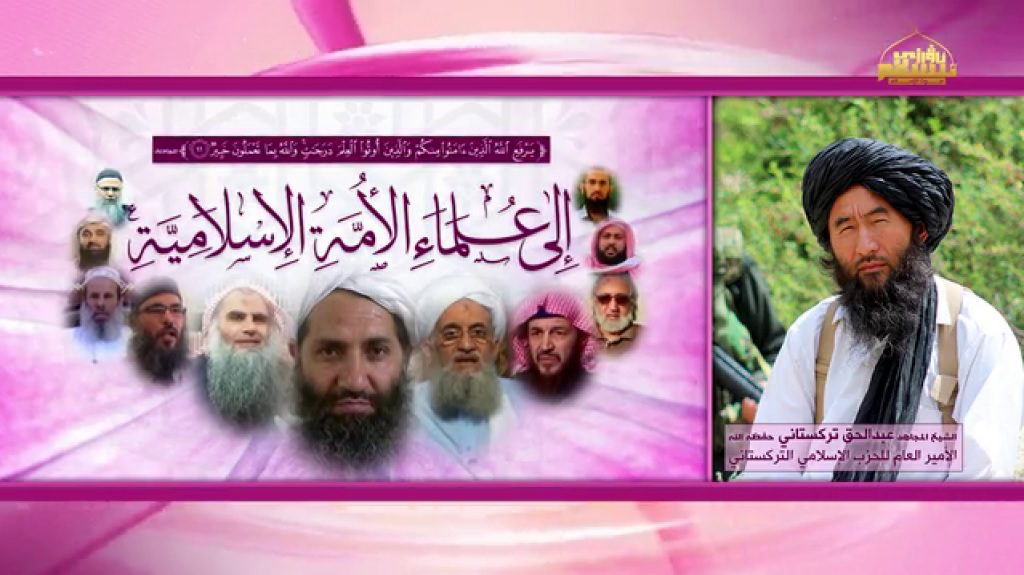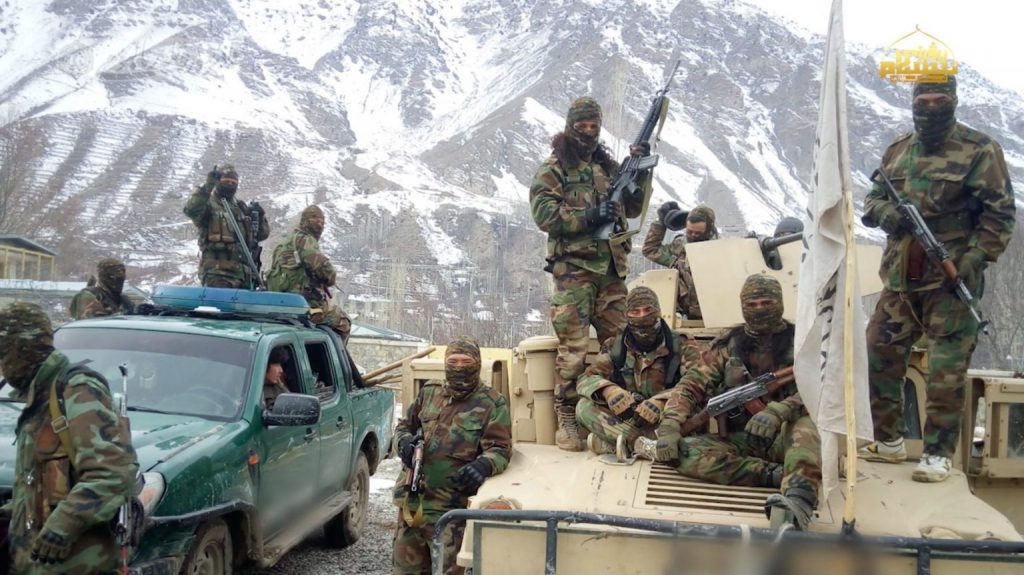Analysis: Taliban continues to lie about presence of foreign fighters in Afghanistan

On Dec. 4, FDD’s Long War Journal reported on a new video released by the Turkistan Islamic Party (TIP), an al-Qaeda-affiliated group that is loyal to the Taliban and fights under its umbrella in Afghanistan. The video shows TIP members training and and fighting in Afghanistan. Overall, the video is a pretty typical example of jihadist messaging.
But the Taliban, which seeks to negotiate an American and Western withdrawal from Afghanistan in exchange for its supposed counterterrorism assurances, wasn’t happy that we noticed the TIP’s video.
Earlier today, the Taliban released a statement attributed to its spokesman, Zabihullah Mujahid, who claims there “are no foreign nationals present in Afghanistan.” The Taliban’s mouthpiece insists that “all foreign Mujahideen and nationals that had arrived in Afghanistan during the war against the Soviet Union left” after the U.S.-led invasion, “returning back to their country of origin and others taking refuge in other Arab countries.”
This is an implausible and ridiculous assertion on its face, as the presence of al-Qaeda and Taliban-affiliated foreign fighters in Afghanistan since late 2001 is well-known. It should be noted that senior Taliban-Haqqani figures have actually called for foreign reinforcements in the past.
With respect to the TIP’s video, Zabihullah Mujahid says the following: “The video published in Syria showing an image montage from Afghanistan with Afghan military and civilian fatigues, American Humvee APCs and Ford Ranger vehicles along with weapons are taken from a video of a Jihadi Unit of the Islamic Emirate and then falsified into this release with the ill-intention of creating mistrust.”

Although Mujahid’s assertion is not credible, it is noteworthy for the reasons discussed below.
First, the Taliban is, in effect, accusing the Turkistan Islamic Party (also known as the Eastern Turkistan Islamic Movement, or ETIM) of lying, because the TIP’s men produced the video montage.
The video in question was first posted by the TIP’s dedicated Telegram channel for its Afghanistan operations with the hashtag ‘Khurasan’ denoting that the video is indeed from Afghanistan. The video was then subsequently released on the TIP’s main Uighur-language website, Muhsinlar.
The dedicated Telegram channel that first disseminated the video has been shared by numerous other TIP social media accounts, including official channels. In addition to TIP propaganda, the channel also routinely shares the Taliban’s operational claims.
So if anyone “falsified” the video — and, in reality, no one did — then it was the TIP itself.
Second, you’ll note that Mujahid doesn’t dispute that the images are from Afghanistan. He even claims that the images are of a “Jihadi Unit of the Islamic Emirate,” meaning the Taliban. The Taliban spokesman may be inadvertently disclosing the truth here, as the TIP fights under the Taliban’s banner, as does al-Qaeda, as well as other al-Qaeda-affiliated groups.
Third, and perhaps most importantly, there is no real dispute over the presence of TIP fighters in Afghanistan. Various sources, including those mentioned below, make it clear that the TIP’s men train and fight in the country. This makes the Taliban’s denial all the more curious.
Not only did the TIP produce the video in question, the group has advertised its presence in Afghanistan and loyalty to the Taliban on other occasions.
In early 2018, for example, the TIP promoted joint raids it conducted alongside the Taliban. In March of this year, the TIP’s emir, Abdul Haq al-Turkistani, once again signaled his ongoing loyalty to both al-Qaeda leader Ayman al-Zawahiri and the Taliban’s top man, Haibatullah Akhunzada. Al-Qaeda consistently refers to Akhundzada as the “Emir of the Faithful,” a title usually reserved for a caliph, and Zawahiri has sworn fealty to him. Abdul Haq called on al-Qaeda and Taliban figures to vocalize their support for the Uighurs’ cause, and al-Qaeda’s general command responded with a statement praising the TIP’s steadfastness in Afghanistan and elsewhere.
Indeed, the TIP’s presence in Afghanistan is both longstanding and well-known. For years, the U.S. and its allies have infrequently targeted ETIM/TIP jihadists, who are often embedded with their Taliban allies in Afghanistan. Most recently, the ETIM/TIP’s foothold in the northern province of Badakhshan has been reported by a number of sources.
In early Feb. 2018, the U.S. military and NATO’s Resolute Support announced that a series of airstrikes were carried out against Taliban training camps in Badakhshan, explaining that ETIM/TIP fighters received instruction at the same facilities.
With days of the U.S.-led airstrikes, Afghan officials told Radio Free Europe/Radio Liberty’s Gandhara page that they were fighting ETIM/TIP militants in Badakhshan. That same outlet reported earlier this year that the Taliban was implementing its harsh version of Sharia in some parts of the province.
In January, a UN monitoring team noted that the “Al-Qaeda affiliated Eastern Turkistan Islamic Movement…maintains a presence in Taliban-held areas of Badakhshan province” and named its “local leader” as Hajji Furqan, with another jihadist, Mawlawi Ibrahim, serving “as his deputy.”
In June, the UN monitoring team reported that the Taliban “cooperate[s] and retain[s] strong links” to more than 20 “regionally and globally focused groups,” including the TIP/ETIM. The UN noted that the TIP operates in Badakhshan province and estimated that the group has “approximately 400 foreign terrorist fighters” in Afghanistan. [For more, see FDD’s Long War Journal reports, UN: Al Qaeda continues to view Afghanistan as a ‘safe haven’ and Al Qaeda growing stronger under Taliban’s umbrella, UN finds.]
The ETIM/TIP is just one of the foreign terrorist groups listed in the UN’s reporting, as well as in U.S. military assessments. In November, the Lead Inspector General (Lead IG) to the United States Congress on Operation Freedom’s Sentinel (OFS) released a table of the various foreign terrorist organizations fighting in the country. The table was produced with information provided by US Forces-Afghanistan (USFOR-A). The ETIM/TIP was assessed to have just 100 fighters, though estimates of its force size vary according to source. Other al-Qaeda and Taliban-aligned groups that include foreign fighters are also listed on the table, which can be found on page 19 of the report.
All of this raises additional questions concerning the Taliban’s supposed counterterrorism assurances, which were offered during negotiations with the U.S. State Department.
“The Taliban have committed, to our satisfaction, to do what is necessary that would prevent Afghanistan from ever becoming a platform for international terrorist groups or individuals,” Special Representative Zalmay Khalilzad, who has led the talks, told The New York Times in January of this year.
Nearly a year later, however, the Taliban won’t even publicly admit that foreign terrorist groups such as the ETIM/TIP are operating inside Afghanistan. Instead, the group claims that all foreign fighters left years ago — an absurd statement.
We don’t know what, exactly, the Taliban’s representatives have told Khalilzad behind closed doors. Both Khalilzad and Secretary of State Mike Pompeo have vouched for the Taliban’s purported counterterrorism assurances in the event that a deal is finalized.
But it is telling that the Taliban is still unwilling to admit — in public — that foreign fighters are even present. Indeed, Mujahid’s statement is filled with concern that the TIP’s video may force some accountability in this regard. The Taliban accuses others of seeking a “pretense for the presence of American invaders in the region.” Again, the Taliban must mean the TIP’s media team, because that’s who produced the montage.
“The Islamic Emirate assures regional and world countries that the soil of Afghanistan will not be used against any other country and is hopeful that other countries will also have a reciprocal policy,” Mujahid’s statement reads.
The Taliban’s refusal to publicly acknowledge the presence of its foreign jihadist allies is just one reason that this oft-repeated statement isn’t believable.
The TIP’s presence in Afghanistan, Syria or elsewhere certainly doesn’t justify China’s oppression of the Uighur population. The overwhelming majority of Muslims in western China have nothing to do with the group, or jihadism in general. The TIP has also attempted to use China’s human rights abuses in its own recruitment efforts. But the TIP is an international jihadist organization, with some of its members traveling from the Taliban’s ranks in Afghanistan to Syria. The Taliban’s lies regarding the TIP and foreign jihadists shouldn’t obscure basic facts about the group.
